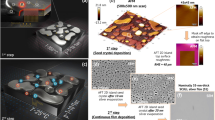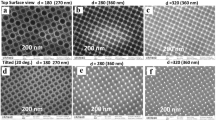Abstract
PROF. R. W. WOOD, of Johns Hopkins University, has recently reported1 on the successful preparation of diffraction gratings by ruling on 'aluminized' surfaces, and predicts a bright future for this type of dispersive instrument. One of the most interesting aspects of this technique, however, is not included in his letter. Inasmuch as I participated in the conception and development of the general method of preparing and ruling evaporated films at Cornell University early in 1934, which method Prof. Wood was induced to adopt about a year later, I feel that I am in a position to offer some comments of interest.
This is a preview of subscription content, access via your institution
Access options
Subscribe to this journal
Receive 51 print issues and online access
$199.00 per year
only $3.90 per issue
Buy this article
- Purchase on Springer Link
- Instant access to full article PDF
Prices may be subject to local taxes which are calculated during checkout
Similar content being viewed by others
References
NATURE, 140, 723 (1937).
Author information
Authors and Affiliations
Rights and permissions
About this article
Cite this article
WILLIAMS, R. Diffraction Gratings ruled in Metallic Films. Nature 141, 329–330 (1938). https://doi.org/10.1038/141329b0
Issue Date:
DOI: https://doi.org/10.1038/141329b0
Comments
By submitting a comment you agree to abide by our Terms and Community Guidelines. If you find something abusive or that does not comply with our terms or guidelines please flag it as inappropriate.



